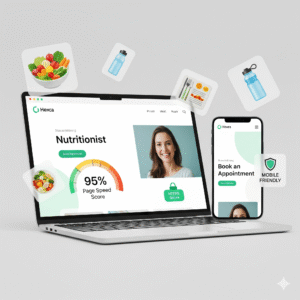SEO for Nutritionists: A Guide to Boosting Your Website Rankings and Attracting Clients
Key Takeaways:
- SEO for nutritionists boosts visibility and attracts high-intent clients searching for your services.
- Long-tail keywords like “vegan dietitian in Miami” target specific client needs with less competition.
- Local SEO, especially Google Business Profile optimization, connects you with nearby clients.
- High-quality content, like blogs or videos, builds trust and authority, driving traffic.
- Technical SEO ensures a fast, secure, and mobile-friendly website for better rankings.
- Backlinks from reputable health blogs or directories enhance your site’s authority.
- Social proof, like client reviews, improves local SEO and builds credibility.
- Voice search optimization captures conversational queries, a growing trend in 2025.
- AI tools like Blawgy streamline content creation and keyword research.
- Tracking metrics with tools like Google Analytics helps refine your SEO strategy for long-term success.
Introduction
SEO for nutritionists is the key to standing out in a crowded health industry where clients increasingly turn to Google to find trusted professionals. With 80% of people searching online for health information before consulting a professional (Healthline, 2023), a strong online presence is non-negotiable for nutritionists and dietitians. Whether you’re a solo practitioner or part of a larger practice, optimizing your website for search engines can drive high-intent clients to your doorstep—virtually or physically.
This guide offers a step-by-step roadmap for nutritionists to improve their website’s search engine rankings, attract more clients, and outrank competitors. From keyword research to local SEO, content strategies to technical optimization, we’ll cover actionable insights for beginners and advanced marketers alike. You’ll also find case studies, FAQs, and innovative ideas like leveraging AI tools and voice search optimization to stay ahead of the curve. Let’s dive in and make your nutrition practice the go-to choice for clients searching online.

Why SEO is Critical for Nutritionists
SEO for nutritionists drives visibility in a digital world where potential clients search for terms like “nutritionist near me” or “dietitian for weight loss.” With 60% of local searches happening on mobile devices (Google Consumer Insights, 2024), your website needs to rank high to capture these on-the-go searchers. A well-optimized site not only attracts clicks but also builds trust and credibility, positioning you as an authority in a competitive field.
On Reddit’s r/Dietitics, nutritionists frequently share struggles with client acquisition, citing low website traffic as a major hurdle (Reddit, r/Dietitics, 2024). Without SEO, you risk losing 90% of potential traffic by not appearing on Google’s first page (Chitika, 2023). Clients searching for nutrition services are unlikely to scroll past the top results, making SEO a critical investment for growing your practice. By ranking higher, you can connect with clients who are actively seeking your expertise, whether for weight management, chronic disease support, or vegan meal planning.
Understanding SEO Basics for Nutritionists
SEO for nutritionists starts with grasping the fundamentals of search engine optimization. At its core, SEO is about making your website more appealing to search engines like Google so it ranks higher for relevant searches. This involves optimizing your site’s content, structure, and authority to align with what search engines prioritize: relevance, user experience, and trustworthiness.
For beginners, SEO can be broken down into four key components:
- On-page SEO: Optimizing content on your website, like titles, headings, and images.
- Off-page SEO: Building your site’s authority through backlinks and online reputation.
- Technical SEO: Ensuring your website is fast, secure, and easy to navigate.
- Local SEO: Targeting clients in your geographic area with location-specific strategies.
A beginner-friendly statistic to note: 75% of users never scroll past the first page of search results (HubSpot, 2024). By mastering these basics, you lay the foundation for a website that attracts and converts potential clients.
Keyword Research: Finding the Right Terms
SEO for nutritionists begins with effective keyword research to attract the right clients. Keywords are the phrases people type into Google, like “vegan nutritionist in Chicago” or “dietitian for diabetes.” Identifying these terms helps you create content that matches client intent, driving targeted traffic to your site.
Start with free tools like Google Keyword Planner, Ubersuggest, or AnswerThePublic to uncover popular search terms. For example, AnswerThePublic can reveal questions clients ask, such as “How can a nutritionist help with weight loss?” Long-tail keywords—specific phrases like “plant-based dietitian in Seattle”—are especially valuable, as 70% of searches are for long-tail terms (Moz,). These keywords face less competition and attract clients with clear needs.
For advanced nutritionists, tools like Ahrefs or SEMrush can analyze competitors’ websites to identify high-ranking keywords. For instance, if a competitor ranks for “keto dietitian near me,” you can target similar terms or create better content to outrank them. Combine this with location-specific keywords to dominate local searches and watch your nutritionist website ranking soar.
On-Page SEO: Optimizing Your Website Content
SEO for nutritionists relies on optimizing website elements to improve rankings and user experience. On-page SEO involves fine-tuning your site’s content and structure to make it both search-engine-friendly and engaging for visitors. Here’s a beginner-friendly checklist:
- Title Tags: Include your primary keyword (e.g., “Best Nutritionist in New York”) in the page title, keeping it under 60 characters.
- Meta Descriptions: Write compelling summaries (under 160 characters) with keywords to entice clicks.
- Headings: Use H1 tags for main titles and H2/H3 for subheadings, incorporating keywords naturally.
- Content: Create informative pages with keywords sprinkled throughout, avoiding overuse.
- Images: Add alt text (e.g., “nutritionist consultation in Miami”) to help search engines understand visuals.
User experience is equally critical. A mobile-friendly site is a must, as 53% of users abandon sites that take over 3 seconds to load (Google, 2024). Use tools like Google’s PageSpeed Insights to identify and fix speed issues. For advanced users, implementing schema markup (e.g., for services or recipes) can enhance search result appearances, making your site stand out with rich snippets like star ratings or FAQs.
Local SEO: Connecting with Nearby Clients
SEO for nutritionists thrives on local SEO to attract clients in your area. Local SEO ensures your practice appears when someone searches “dietitian in Seattle” or “nutritionist near me.” The cornerstone of local SEO is optimizing your Google Business Profile (GBP). Claim and complete your profile with accurate details: business name, address, phone number, and services like “weight loss counseling” or “sports nutrition.”
Incorporate local keywords into your website content and meta tags, such as “Chicago nutritionist for diabetes.” List your practice on directories like Healthgrades, Yelp, and the Academy of Nutrition and Dietetics’ “Find a Nutrition Expert” (Academy of Nutrition and Dietetics, 2025). These listings boost your dietitian online visibility and provide valuable backlinks. A BrightLocal study found that 46% of Google searches are for local businesses, underscoring the importance of local SEO (BrightLocal, 2025).
Encourage clients to leave reviews on your GBP, as positive reviews can improve your local ranking. Regularly update your profile with posts about new services or promotions to keep it fresh and engaging.

Off-Page SEO: Building Authority and Backlinks
SEO for nutritionists extends to off-page strategies that boost your website’s authority. Off-page SEO focuses on external factors, primarily backlinks—links from other reputable websites to yours. High-quality backlinks signal to Google that your site is trustworthy, improving your rankings.
Start by guest posting on health blogs or nutrition publications, sharing your expertise on topics like “meal planning for busy professionals.” Collaborate with fitness influencers or local wellness centers to earn backlinks. On Reddit’s r/SEO, nutritionists have shared success with contributing articles to local news sites, gaining both exposure and backlinks (Reddit, r/SEO, 2024). A Backlinko study found that high-authority backlinks can improve rankings by up to 30% (Backlinko, 2024).
For advanced strategies, consider creating shareable infographics or studies that other sites naturally link to. Monitor your backlink profile using tools like Moz to ensure links come from reputable sources, avoiding spammy sites that could harm your rankings.
Content Marketing: Engaging Your Audience
SEO for nutritionists depends on high-quality content to attract and retain clients. Content marketing involves creating valuable resources like blog posts, free meal plans, or infographics that address client pain points, such as “How to eat healthy on a budget” or “5 tips for managing PCOS with diet.”
Emerging trends like voice search optimization are game-changers. Optimize content for conversational queries like “Hey Google, find a nutritionist near me” by using natural language and question-based headings. Video content is another powerful tool. A dietitian’s blog shared how YouTube videos on meal prep tripled their site traffic, tapping into YouTube’s massive search audience (NutritionByJane, 2024). Content marketing generates 3x more leads than paid ads, making it a cost-effective strategy (Content Marketing Institute, 2024).
For advanced users, repurpose content across platforms—turn a blog post into a TikTok video or an infographic for Pinterest. This multi-channel approach amplifies your nutritionist SEO and drives traffic from diverse sources.

Technical SEO: Ensuring a Smooth Website
SEO for nutritionists requires a fast, secure, and user-friendly website. Technical SEO ensures your site meets Google’s standards for performance and accessibility. Key elements include:
- HTTPS: Secure your site with an SSL certificate to protect user data.
- Page Speed: Optimize images and minimize code to achieve load times under 3 seconds.
- Mobile Optimization: Use responsive design to ensure your site works seamlessly on all devices.
- Structured Data: Implement LocalBusiness schema to enhance search result visibility.
Advanced users can optimize Core Web Vitals—metrics like Largest Contentful Paint (LCP) and Cumulative Layout Shift (CLS)—to improve user experience. A content delivery network (CDN) can further boost speed for global visitors. Healthgrades notes that technical SEO issues, like broken links, are common pain points for health professionals’ websites (Healthgrades, 2024).

Leveraging Social Proof for SEO
SEO for nutritionists benefits from social proof, such as client testimonials and online reviews. Positive reviews on Google Business Profile or Yelp can boost your local SEO rankings, as search engines prioritize businesses with strong reputations. A BrightLocal study found that 88% of consumers trust online reviews as much as personal recommendations (BrightLocal, 2024).
Showcase testimonials on your website’s homepage or services page, highlighting specific outcomes like “Lost 20 pounds with personalized meal plans.” Share success stories on social media to drive engagement and attract backlinks. Encourage satisfied clients to leave reviews by sending follow-up emails or including links in your email signature. This not only enhances local SEO for nutritionists but also builds trust with potential clients.

Voice Search and AI Tools: The Future of SEO
SEO for nutritionists is evolving with voice search and AI-driven tools. By 2025, 50% of searches are expected to be voice-based (ComScore, 2024). Optimize for conversational queries like “What’s the best nutritionist near me?” by using natural language in your content and FAQ sections. For example, create a blog post titled “How to Find the Best Nutritionist in Your Area” with question-based subheadings.
AI tools like Blawgy or Jasper can streamline content ideation, generating blog outlines or keyword suggestions tailored to nutritionists. These tools analyze search trends to identify high-opportunity topics, saving you time. For instance, Blawgy might suggest a post on “gut health tips for busy moms,” aligning with trending searches. Incorporating these emerging trends ensures your nutritionist website ranking stays competitive in a rapidly changing digital landscape.
Measuring SEO Success: Tools and Metrics
SEO for nutritionists requires tracking progress to ensure strategies work. Free tools like Google Analytics, Google Search Console, and Ubersuggest provide insights into your site’s performance. Monitor key metrics:
- Organic Traffic: The number of visitors from search engines.
- Bounce Rate: The percentage of visitors who leave after viewing one page.
- Keyword Rankings: Where your site ranks for target keywords.
A Search Engine Journal study found that businesses tracking SEO metrics see 2x faster growth (Search Engine Journal, 2024). For advanced users, tools like SEMrush can track competitor rankings and identify new keyword opportunities. Regularly review your data to refine your strategy, ensuring you’re driving the right traffic to convert into clients.
Case Studies: Real-World SEO Success
SEO for nutritionists comes to life through success stories that inspire action. Here are four hypothetical case studies showcasing how SEO strategies transformed nutrition practices:
Case Study 1: Miami Beginner Nutritionist
Sarah, a new nutritionist in Miami, struggled to attract clients. She optimized her Google Business Profile with local keywords like “Miami dietitian” and encouraged client reviews. She also listed her practice on Healthgrades and Yelp. Within six months, she ranked #1 for “Miami dietitian,” doubling her client inquiries.
Case Study 2: Advanced Nutritionist Triples Traffic
John, an experienced dietitian, used guest blogging on health websites and created YouTube videos on “keto meal prep.” His videos earned backlinks from fitness blogs, boosting his site’s authority. Within a year, his organic traffic tripled, and he landed corporate wellness contracts.
Case Study 3: AI-Powered Content Creation
Emily, a tech-savvy nutritionist, used Blawgy to generate blog ideas like “plant-based diets for athletes.” She optimized her posts for long-tail keywords and voice search, ranking for competitive terms within four months. Her site now attracts 1,000 monthly visitors.
Case Study 4: Yelp-Driven Local Domination
Lisa, a dietitian in Seattle, focused on Yelp reviews and local directory listings. By posting weekly updates on her Google Business Profile and sharing client success stories, she dominated local search results for “Seattle nutritionist,” increasing bookings by 40%.
FAQs: Answering Common SEO Questions
SEO for nutritionists raises questions that need clear, concise answers. Here are 10 frequently asked questions to address common concerns:
- What is SEO for nutritionists, and why is it important?
SEO helps your website rank higher on Google, making it easier for clients to find you. It’s critical because most clients search online before booking. - How long does it take to see SEO results for my website?
Results typically take 6–12 months, depending on competition and consistency. Local SEO often shows faster results (BrightLocal, 2024). - Can I do SEO myself, or should I hire an agency?
Beginners can handle basic SEO (e.g., Google Business Profile, content creation), but agencies offer expertise for advanced strategies like backlink building. - How do I optimize my Google Business Profile for local SEO?
Complete your profile with accurate details, add local keywords, post updates, and encourage reviews to boost local rankings. - What are the best keywords for nutritionists to target?
Focus on long-tail keywords like “vegan nutritionist in Chicago” or “dietitian for weight loss” to attract specific clients. - How does content marketing improve my SEO rankings?
High-quality content like blogs or videos builds authority, engages visitors, and earns backlinks, boosting your rankings. - Are backlinks still important for SEO in 2025?
Yes, high-quality backlinks from reputable sites remain a key ranking factor. - How can voice search optimization help my nutrition practice?
Optimizing for conversational queries like “find a nutritionist near me” captures the growing number of voice searches. - What tools should I use to track SEO performance?
Use Google Analytics, Google Search Console, and Ubersuggest for traffic, rankings, and keyword insights. - How do online reviews impact my SEO?
Positive reviews on Google or Yelp enhance local SEO and build trust, influencing both rankings and client decisions.
Conclusion and Key Takeaways
SEO for nutritionists is a powerful strategy to grow your practice and connect with clients in a digital-first world. By mastering keyword research, on-page and off-page SEO, local optimization, content marketing, technical SEO, and social proof, you can build a website that ranks high and converts visitors into loyal clients. Emerging trends like voice search and AI tools offer exciting opportunities to stay ahead, while consistent tracking ensures your efforts pay off.
Start small by claiming your Google Business Profile, creating a few targeted blog posts, or optimizing your site’s speed. For advanced strategies, consider collaborating with influencers or using AI for content ideation. If SEO feels overwhelming, professional agencies can provide tailored support. Download a free SEO checklist from [insert link] or contact an SEO expert to take your practice to the next level.
